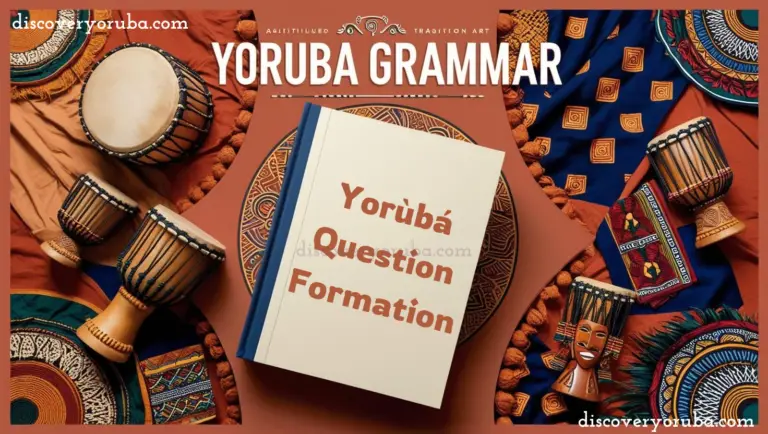DiscoverYoruba.com is your one-stop for embracing Yoruba culture, entertainment, and history unfolding.

Many descendants of Odùduwà living outside Nigeria face a growing challenge—how to pass on the Yorùbá language to their children. Surrounded by dominant languages like English, French, or Spanish, many Yorùbá children abroad grow up unable to speak or understand their heritage language. Yet, language is more than just a means of communication—it carries culture, identity, history, and pride.
So, how can we nurture our children’s Yorùbá roots even when far from home? Let’s begin with a story.
Bàbá Ọmọtáyọ’s Mango Tree Tales
If you ever visit Bàbá Ọmọtáyọ’s house, you’ll find him sitting under the shade of a mango tree on his wooden stool, his grandchildren gathered around like little chicks around a mother hen. His stories, rich with wisdom, always carry a lesson.
“When I was a young man,” he began one sunny afternoon, “I had a dear friend named Adé who moved to England. Before leaving, he swore his children would speak Yorùbá at home. But once they arrived in England, English swallowed his promise.
Every time he called home, his children would interrupt him, ‘Daddy, speak English!’ and laugh when he tried to speak Yorùbá.
Years later, Adé’s mother came to visit from Nigeria. She spoke only Yorùbá, and her grandchildren—her own flesh and blood—couldn’t understand her. They simply stared, giggling. And she, with love and confusion in her eyes, stared back. That day, Adé sat with tears in his eyes, realizing that something precious had slipped away.”
Bàbá Ọmọtáyọ paused, his voice low. “But Adé didn’t give up. Every evening, he gathered his children and told them folktales in Yorùbá. They watched Yorùbá movies. He sang them songs from his childhood. Within months, their ears tuned in, their tongues followed, and the language came alive again. When their grandmother visited once more, her smile said everything—her grandchildren greeted her in fluent Yorùbá.”
He looked into the eyes of his grandchildren and said softly, “Never lose your heritage. It carries your ancestors, your stories, your soul.”
Practical Ways to Teach Yorùbá Abroad
If you’re a Yorùbá parent living in the diaspora, here are simple but powerful ways to help your children learn Yorùbá:
1. Speak Yorùbá at Home
Make Yorùbá a natural part of everyday conversation. Even if your children respond in English, keep speaking Yorùbá. The consistency pays off.
2. Use Yorùbá Cartoons and Movies
Learning through fun works wonders! Explore Yorùbá cartoons, nursery rhymes, and films with subtitles. It’s entertainment and education rolled into one.
3. Read Yorùbá Books Together
Read Yorùbá stories, proverbs, and children’s books with your kids. Pause to explain and translate as needed. It boosts vocabulary and builds curiosity.
4. Sing Yorùbá Songs
Songs stick! Teach your children simple Yorùbá songs like “Ọmọ Yorùbá ni mi, má bà mí sọ̀rò Yorùbá.” Music is a joyful way to pass on language and values.
5. Label Household Items in Yorùbá
Stick Yorùbá name labels on common objects: door (ìlẹ̀kùn), chair (àga), water (òmì). This helps children associate words with real-life items daily.
6. Join Yorùbá Communities or Groups
Find a local or virtual Yorùbá-speaking group. Children learn languages faster in social settings. Look for cultural meetups, churches, or online spaces.
7. Visit Nigeria or Enroll in Virtual Classes
If possible, visit Nigeria during holidays to immerse your children in the language. If not, many great online Yorùbá classes can offer structure and consistency.
Raising a Yorùbá-speaking child abroad may take effort, but the reward is priceless. As Bàbá Ọmọtáyọ’s story reminds us—it’s never too late to reclaim the gift of language.
So we ask you today:
How precious is your mother tongue to you? Do you treasure it enough to pass it on?
If yes, start today. Speak it, sing it, share it. Give your children the lifelong pride of being able to say with joy: “Ọmọ Yorùbá ni mi.”
Written with love by Discover Yoruba: Sharing language, culture, and pride across generations.
References
- Akinwunmi, T. (2019). Yoruba Language and Its Importance in the Diaspora. Lagos: Yoruba Heritage Press.
- Bamgbose, A. (1995). Language and the Nation: The Language Question in Sub-Saharan Africa. Edinburgh University Press.
- Fafunwa, B. (1974). History of Education in Nigeria. London: George Allen & Unwin.
- Owolabi, K. (2006). Nigeria’s Native Languages Today: The Reality of the Quest for Survival. Ibadan: John Archers Publishers.










